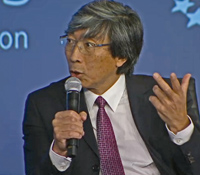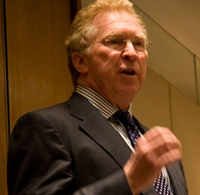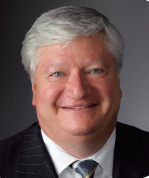
The Forbes 2015 list of the richest people on the planet has become longer this year with the addition of even more billionaires. We found five health IT pioneers on the list you've probably heard of.
There are 1,826 billionaires in the world. This year's Forbes list includes 290 newcomers. The top three on the list are Bill Gates, who made his $70.2 billion via Microsoft; Carlos Slim Helu, who garnered his $77.1 billion in the telecom business; and Warren Buffet, investor extraordinaire, who racked up $72.7 billion.
Of the five health IT billionaires, there is one newcomer.
 1. Patrick Soon-Shiong is No. 96 on the Forbes list with $12.2 billion.
1. Patrick Soon-Shiong is No. 96 on the Forbes list with $12.2 billion.
Medical researcher, professor, surgeon and self-made billionaire Patrick Soon-Shiong is listed under pharmaceutical on the Forbes list. But, he could be listed under health IT. He is the founder of NantHealth, a company that has built a cloud-based and bi-directional clinical operating system, that he says is agnostic to any device or electronic health record. He has said he plans to put up NantHealth for public offering this year. Recently, the man, who is known as the "richest doctor in the world," has been focused on a mission to eradicate cancer. On March 2, Soon-Schiong announced that NantHealth and Allscripts would collaborate on the development and delivery of precision medicine at the point of care. "We look forward to working in partnership with the Allscripts team as the first major clinical EMR vendor to take a major advancement towards the interoperability necessary to enable physicians and patients to stay engaged and active – before, during and after treatment – and enable the most appropriate, personalized intervention as early as possible," Soon-Shiong said in a press statement.
[See also: NantHealth, Allscripts take on cancer]
 2. Judy Faulkner is No. 663 on the list, with a net worth of $2.8 billion.
2. Judy Faulkner is No. 663 on the list, with a net worth of $2.8 billion.
She founded Verona, Wis.-based Epic Systems in 1979. Forbes pegs Epic’s 2011 revenue at $1.2 billion.
Faulkner is a former member of the government's 20-member Health IT Policy Committee, which advises the Office of the National Coordinator for Health IT.
Clients include many of the country's top hospitals, such as Kaiser Permanente, Cleveland Clinic, Johns Hopkins and Cedars-Sinai. Cerner, whose CEO is next on the list, is Epic's chief competitor. Also, both companies are vying for an $11 billion contract to build and deploy an electronic health record system for the Department of Defense.
[See also: Epic-Cerner competition heats up]
 3. Neal Patterson comes in at 1006, with a net worth of $1.9 billion.
3. Neal Patterson comes in at 1006, with a net worth of $1.9 billion.
Patterson launched Kansas City-based Cerner in 1979 with two colleagues from Arthur Andersen's consulting business. One of those colleagues joins Patterson on the billionaires list for the first time this year. The founders started the company with a single laboratory information system, according to the Cerner website. In 2012 Patterson led the effort to form CommonWell Health Alliance alongside other healthcare IT vendors. The trade organization aims to make interoperability among EHRs easier in order to transfer of patient information across healthcare providers. this past February, Cerner sealed the deal on $1.3 billion acquisition of Siemens Health Services – and now looks forward to as much as $5B in revenue in 2015.In 2013, Cerner's stock shot up 44 percent in 2013, probably due to rising demand for digital healthcare systems spurred by the meaningful use program, Patterson calls himself a devoted follower of Ayn Rand, according to Forbes.
He sits on the government's Health IT Policy Committee, which advises the Office of the National Coordinator for Health IT.
[See also: Cerner seals the deal with Siemens]
 4. Terry Ragon is No. 1190 with a net worth of $1.6 billion.
4. Terry Ragon is No. 1190 with a net worth of $1.6 billion.
Phillip T. (Terry) Ragon founded his privately held company InterSystems in 1978. His product vision – power through simplicity – has deep roots in application development technology invented during the 1960s at Massachusetts General Hospital. Originally conceived as an easy-to-use programming language for doctors, InterSystems developers expanded the technology to create innovative data management products and rapid application development technologies. Today, EHR vendor Epic relies on Intersystems' Caché as a core technology for its EHR software, for example. The connection between Ragon and Epic founder Faulkner goes back to when both were working on the MUMPS Development Committee. MUMPS stands for Massachusetts General Hospital Utility Multi-Programming System.
[See also: What does InterSystems' Caché have to do with Epic's EHR?]
 5. Cliff Illig, another newcomer, is No. 1605, with a net worth of $1.16 billion.
5. Cliff Illig, another newcomer, is No. 1605, with a net worth of $1.16 billion.
Cliff W. Illig, vice chairman of the board and co-founder of Cerner, focuses on growing and expanding Cerner’s market-oriented business units, key strategic relationships and priority corporate initiatives, according to the Cerner website. According to Cerner, Illig’s keen business sense was instrumental in the company’s initial public stock offering in 1986, secondary public offering in 1995 and three two-for-one stock splits in the 1990s. Illig, Patterson and another Arthur Andersen colleague, Paul Gorup, developed the idea for Kansas City-based Cerner in 1979 while studying for the public accountant's exam (for fun) in a park, according to Forbes. Illig previously served as chief operating officer at Cerner until October 1998 and as president until March 1999. Gorup serves today as Cerner's chief of innovation.
[See also: Intermountain to aid Cerner on DoD bid]
See Forbes' complete list here.
























